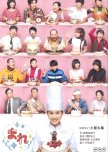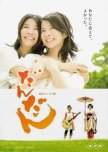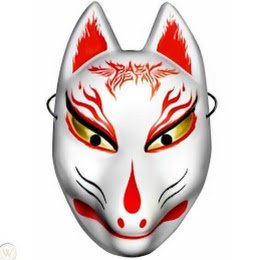
This review may contain spoilers
Could have been a great show about an independent working woman chasing after her dream
First of all, spoilers ahead.Second: If you watched Mare already and like Yamazaki Kento's character Keita, I advise you to stop reading.
"Mare" was the first Asadora I watched and I like Tsuchiya Tao, so needless to say that it made me fall in love with the "Asadora concept". Which is also why I scored it very highly after my first watch. Now that I've seen a few more Asadoras I decided to rewatch exactly because of these reasons.
Mare's character takes a little time to get used to, but it's basically built upon the stereotypical Japanese "I want to do my utmost best" template, which I don't necessarily dislike. Tsuchiya Tao did, in my opinion, a great and believable job with the character and her expressions and gestures added a lot of humor. The story of becoming a chef/baker/patissier is also nothing new, but thanks to the fact that it's an Asadora we get a much more detailed look at how hard it is to become one, even if it probably wasn't very realistic (the same as most Asadoras). I also really liked most of the side characters, especially the best friend for most of the story, Minori (Kadowaki Mugi), the little brother Ittetsu (Hayama Shono) and the "foster grandparents" played by Tanaka Yuuko and Tanaka Min. Their coolheadedness and dry humor/sarcasm added a lot of enjoyment for me. But let me get into why I decided to write a review and why I wrote the second point of my opening.
Like I said in the headline, it could have been a great drama about a woman who decides to be independent and chase after her dream of becoming a patissier, even though she tells herself that she hates dreams. Unfortunately the emphasis is on "COULD HAVE". Which is when the character Keita enters the picture, who's probably my most disliked character in all the Asadoras I've watched so far. He's boring, he's boorish, he's selfish, he's extremely single-minded and he can't read the atmosphere in a room. The worst part is that he says to Mare, in one of the first weeks when they're still in High School, "it's wrong for you to selfishly ask me to set aside my dream" and then he's actually really happy when the woman he supposedly loves (Mare) gives up the probably one chance of fulfilling her own dream that's directly in front of her after working at it for almost ten years just so she can support him by basically becoming the maid of his grandfather's lacquer shop. Long story short, all he has going for him are his looks and the only traits that could've made the character worse are that he's an alcoholic and cheats on his wife. Don't get me wrong, I like Yamazaki Kento and his acting, but even if he'd be the best actor in the world, there's nothing he could've done differently. In my opinion this character was a hair's breadth away from destroying the story and turning it into another "a Japanese woman should support her husband above everything else" drama for the majority of the second half. Without Keita, "Mare" would've probably been my second favorite Asadora (after Natsuzora and tied with Amachan), but the writer's incomprehensible need for a woman to marry and make babies before she turns 30 (which is the only reason I can see why the story went that way) let it definitely slip a few ranks.
Thankfully everything before she marries (again, why anyone would ever fall in love with a guy like that is still a mystery to me, especially because she had a much better option) and everything after the writer remembered what the story was all about is very enjoyable, but in my eyes "Mare" is one of the best examples of how one support character can almost destroy the story/purpose of a 156 episode drama, regardless of everything else that was good about it.
Edit: After watching a few more episodes again I can't believe this was actually written by a woman because the character Mare is actually the perfect example of the sad stereotype Japanese men have about working women ("Why should we promote a woman when she's going to give up on her career anyways as soon as she marries") and why Japan is last in every statistic by a long shot when it comes to "women in leading business positions".
Was this review helpful to you?

This review may contain spoilers
One quote to sum up Dandan: "Whatever happens, stay in touch and help each other out" - said the guy, actually the twins' father, who didn't want them to ever meet and didn't want them to ever meet again after they found out about each other.Story: The biggest problem of the series, in my opinion, is probably that you wouldn't know they're twins if they weren't looking exactly alike. They don't know of their existence until their 18th birthday, so everyone would probably expect them to be really close after they decide to acknowledge each other, but it's more like they're distant cousins rather than sisters, let alone identical twins. The amount of scenes they are in together is probably less than the number of episodes the show has and I couldn't really see much chemistry between them if they were together. Both of them solved their respective problems/hardships without the other and the few episodes they really relied on each other were marginal problems without impact on the story. The synopsis is also a bit misleading. The whole singing career part probably takes up 4 or 5 weeks. Most of the first half of the series, after they decided to stay in touch, is them agonizing over or denying that they want to pursue a music career. There are whole weeks when nothing at all happens and then there are weeks when everything happens all at once, without leadup or explanation. Just to give an example, in one of the last weeks of the series Megumi and the "male lead" act like they barely know each other and the next week they are suddenly married (not getting married, they already are out of the blue), without proposal or leadup at all. Sure, there was some romantic tension between them, but that was in the first half of the series, before they were even in the music business (which happens pretty much in the middle of the story).
In my opinion, most of what happens in Matsue is rather boring and the most enjoyable and interesting parts of the story all take place in Gion, even if I'm not a fan/not interested in Geiko culture and their traditions.
Acting: I can't say that I was impressed with anyone's acting. The twins, while overall pretty likeable, often looked like they saw a flying pig everytime something happened, even if it wasn't surprising at all. The accents often sounded pretty forced from almost every actor/actress and most of the characters, mainly from Matsue, were either forgettable, annoying or seemed a bit "uneducated". The best job did probably the Okami, Fujimura Shiho and the Geikos, especially Kyono Kotomi and Kimura Fumino, even if their roles were very small. The worst performance was definitely by Yamaguchi Shoko, who plays the "male lead", the music producer Ishibashi. It was like everytime someone needed to push an on button if his part came up. Very robotic throughout the series and he always sounded like he was reading all his lines rather than just saying them. He was also giving me the impression that he's always one step away from luring them into the porn industry. His character seemed like one of those super shady scouts on the streets of Harajuku who are trying to trick girls into debt which they then need to pay back by selling their bodies.
Music: They were or at least wanted to be singers, but it's only 2 or 3 songs they always sing/play. It gets pretty repetitive. Not that they aren't good singers or the songs are bad, but they could've explored the music part a bit more.
I liked some of the side stories and the character development of the twins, but that's probably the only reason why I actually finished the series. I'd only recommend it to people who are really into the Geiko and Gion culture and traditions because that was the best fleshed out part of the story.
Was this review helpful to you?

This review may contain spoilers
A realistic drama with potential wasted by poorly written characters
(Spoiler free section about why I gave my score and a small summary of the story. There's a warning further down for when spoilers start)I really love realistic dramas, especially if they show real problems that are going on at the time it was made. Hot Mama had a lot of potential in that regard but unfortunately the characters, who should be the driving force, are the weakest part of the drama. I liked the business/company part of the story, but you can fast forward though most of the interactions because if you heard the opinion of a character once, it's not going to change. I would have given the story an 8, but I included the characters in that category, which pulled the score down quite a bit.
This drama is for you if you want a realistic drama about a married working woman but you don't care much if the characters are steoretypes or unreasonable. If you want to watch it because you want to see character development and/or you want to know the reasoning for their actions, you shouldn't expect much because you don't get any of it.
One of the themes of the drama, and the point I liked about it, is how it shows the problems a mother faces when going back to work after giving birth. We all know Japan has a real birth rate problem and the government doesn't seem to know what to do about it. Well, if these old men with their pathetic views of women would've watched this drama, they would've recognized one of the biggest problems as soon as they finished the second episode. The chances of a woman being promoted are already slim to none in a Japanese company, getting a private life on the side would make it downright impossible because of the chauvinistic views a lot of male dominated companies still have. But this drama shows an even more common problem. It's almost impossible in these times to create and sustain a family with one income. But it's also impossible in most companies for the mothers to go back to work after coming back from giving birth without colleagues/superiors belittling them. It was a pretty big milestone a few years ago when Japan introduced the right to take maternity leave without the fear of getting fired. In theory that's a real good thing. But in reality, as soon as the mother takes one step out of the company she's being replaced. When she comes back she'll probably start from zero in another department she never wanted to work at. Or if that doesn't happen, it'll be like it's shown in Hot Mama, with at least a few colleagues/superiors trying everything in their might to hinder a successful continuation of the mother's career.
(Spoilers ahead, mainly for characters and their (lack of) development)
This is going to be a bit long, so bear with me please.
Let's get to the big problem of the drama, the characters. Some people really like Motoya, but I really couldn't get over the first episode and the scumbag points he accumulated in it. Scumbag point number one: He definitely needs to learn some self-restraint. He really doesn't need to sleep with a drunk-out-of-her-mind-woman just because she comes on to him, especially not without contraception. Scumbag point two, which makes point one even worse, is that she rejected him a few times already (the first time was five or more years back), so it's definitely not ok to just "go with the flow of the drunk person" or just keep showing up at her apartment like a stalker. If this was a thriller I would have totally bought the old "sitting in a dark appartment and laughing like a mad man" theme while he made the plan to impregnate her so she would stay with him. He was really supportive of her and a real good guy later on, but that doesn't erase the fact that he was a real scumbag in getting there.
So, Natsuki was the victim, right? Well, she was just as much of an idiot the whole time. She's really competent at everything that comes with her job, but that's about the only good trait about her and she accumulated a few big stupidity points, especially at the beginning. First stupidity point, you don't message the person that obviously likes you for a long time and seems like he's as much of an adult when it comes to love as a middle schooler and then get lights out drunk so you don't even remember what happened the next morning. Second stupidity point, after the fact that she accepted her pregnancy and agreed to marry Motoya she keeps hanging around her elite ex in her private time and gets flustered every time he just looks at her. The whole time it seemed like if he would've asked to go to a hotel together she would've run ahead and waited for him there already naked. Please Mr/Mrs Screenwriter, if you want to create realistic characters stop using the old Shoujo Manga trope of the dumb girl that loses all of her common sense when the handsome, rich prince looks at her.
Enough of that, let's look at the supporting characters. Almost every one of them was either a walking stereotype or acted irrationally. Or both at the same time. Natsuki's direct superior was the stereotype of "if you want to be a career woman you are not allowed to show any weakness whatsoever or even smile", otherwise people would think you're "just a woman", even though most people in the company accept and respect career women. Then there was the stereotype overambitious, manipulating and throwing-stones-in-the-way-of-the-main-character colleague who has nothing going for her so she needs to use her "female charm" on the boss to advance in the company while she tries to destroy the main character's career without a visible reason. Speaking of the boss, he just hates working mothers (or working women who are good at their job overall). I really don't know why, but maybe his manliness is threatened, with his leather jacket and biker gang member characteristics. All his "arguments" (can't work the same hours as other workers, needs to take time off all the time, etc) are absolutely crushed immediately after Natsuki comes back to work because she achieves even better results than before her pregnancy. But that doesn't seem to satisfy him and he keeps putting working women who don't flirt with him down and tries to dissolve the baby department, even though it's probably the most profitable in the whole company. Natsuki's best friend is just the stereotypical supportive friend who tries to instill common sense into her. And last but not least is the stereotypical scumbag elite ex-boyfriend of Natsuki who does everything in his power to be the best homewrecker possible. He learns that Natsuki married and has an infant at home and immediately starts to hit on her. He knowingly uses all of her weaknesses (her love for her job/career and that she has maybe lingering feelings for him) against her and even asks her twice to accompany him abroad, even though he knows her daughter's only 6 months old. And to put the cherry on top he uses her lowest moment, when she learns that the department's going to be dissolved, she's probably going to be fired and she's crying her eyes out, to stop her and rather forcefully embrace her. Well done, Kuzu-ouji.
To end the review (rant) on a positive not, there are supporting characters who actually help make the drama more enjoyable. Natsuki's colleague, Nanbu, who's the honest guy that tries to support everyone while trying to win over Natsuki's best friend and the two other moms who are pretty funny and bring a bit of uniqueness with them.
Was this review helpful to you?

It's not bad as a drama, Asadora or story itself, but every one of her friends' stories would've probably been more interesting to watch. That being said, at least she wasn't like Matsushita Nao's character in Gegege no Nyobo who had no free will of her own and her main purpose in life was apologizing to and for all the men she knew (I really disliked to outright hated every character in that Asadora). Maybe I just missed the point and she was supposed to be like a spectator because her future self is narrating the story by telling it to another woman, but it's just that nothing really significant ever happens to her and if something does it's always about her friends, her family, her co-workers, etc. My biggest contra was taht this isn't really why I watch Asadora, the biggest pro was that these stories were actually quite interesting most of the time. So all in all, after balancing it out, it was an ok watch, hence why I gave it a 7.
I actually quite liked her at first, but she annoyed me more and more as the episodes went on. I know these were different times, especially in Japan (well, they at least are supposed to be different now...), where everything concerning women is at least 20 years behind the west, but she never said what was on her mind, and if she did it that one time out of ten, she immediately apologized afterwards and then thanked the other person, just because they let her speak her mind. It happened so often all throughout the Asadora that I dubbed it the "Youko Move" in my head and kind of made it her trademark by which I'll remember her by.
Acting was nothing special. I've seen way better, but then again, I've seen way worse when it comes to Asadora. I didn't watch anything by Inoue Mao before and only knew that she was most famous for being the constantly-sexually-harassed-verbal-punching-bag Shoujo Manga Heroine in Hana Yori Dango, so I didn't go in with high expectations anyways. Overall she did a pretty good job, but everytime she was in a more than 30 seconds conversation or a scene where she "sat around a table" with other people it quickly got awkward and souded more like she (and most of everyone else) was reading the script rather than really acting/meaning what she said. The constant "ah", "eh", "umm" and head tilting of her character didn't help much. I don't really have much to say about the side characters, Kora Kengo was probably the strongest, while I thought that this was Mitshushima Hiraki's weakest performance (from what I've seen with her so far), her overly-cheerful-while-hiding-her-real-feelings character was just annoying most of the time.
The only thing I got to say about the music is that it was an average opening theme. I liked the version without lyrics better because the voice of the singer kind of gave me goosebumps (I'm not good with overly high-pitched voices). But then again, I don't like 90% of Asadora Theme songs, so I shouldn't judge.
So, all in all an ok watch, just a bit worse than average on my Asadora list, but mostly because it wasn't what I expect and think of when it comes to Asadora and because my main draw for rating an Asadora is the Heroine, which was mostly dull and had no outstanding features to remember her by, and her story.
Was this review helpful to you?

Misleading synopsis with "run-of-the-mill" characters
• Overall: For me the synopsis reads like the show is about a "small business", a bookstore to be exact, and two of it's employees. I'm a sucker for these shows, especially if they're more about the characters than the business itself. Tokyo Bandwagon, one of the two recommended shows on the site, is a very good example of what I mean by that. From that perspective the show was a real letdown, because it's actually about a chain store of a big company and their employees with mostly interchangable characters. Their most unique feature is probably that, even though it's a chain store in a shopping mall, they really love books and are not just working there because it's the only company they were accepted at. Almost all of their other character traits are the usual run-of-the-mill never give up sort of things. It gets a 6 from me because it's not bad for what it actually is, but it's nothing I'd recommend to other people, either.• Story: On the surface it's mainly about the two main characters and their efforts in keeping a bookstore alive. But for me, more than anything else, the front and center of the story is about power harassment and misogyny. At least it's the base of almost all of the problems the characters fight. So if you're not a fan of these two topics, you should probably avoid watching, otherwise it'll result in a lot of skipping and fast forwarding every time some kind of big shot starts badmouthing and undermining the characters because they're women and/or working class shop clerks. The most evident example of what I'm talking about was probably how the people in charge of this bookstore chain, that exists for more than 20 years, proudly announced that "she's the first female manager in their company". It took them 20 years, I don't think they should be proud of that. Especially because of all the circumstances surrounding that announcement. I know it's the unfortunate reality in the Japanese business world, but rather than criticizing it, the story shows that companies can just work their way around the problem and basically stay the same.
• Acting: It was good. Nothing outstanding because, as mentioned before, the characters are mostly run-of-the-mill people with a lot of motivation because they love what they do. Probably my favorite character was the one played by Daito Shunsuke. I always like male characters who are not afraid to take a step back in order to support a female in Asian dramas and, in my opinion, he played that role really well and believable.
• Music: Nothing that stands out. Which, for me, is a good thing in a show that wants to be character driven. Oftentimes when it stands out and I really notice the music it's because it's bad, absolutely not my taste or simply annoying.
• Rewatch value: I very rarely rewatch something. If I do it's for 9 or higher rated shows/movies or because of nostalgia. So basically every other show's a 1 for me in that regard.
Was this review helpful to you?

Enjoyable, but with it's flaws
It's a really enjoyable drama or at least the company parts of it are if you can ignore some of details. I especially liked the (inter)personal relationships in Dream Pony and that they showed how people from very different backgrounds all have their strenghts with which they can contribute to a start-up company. I was asking myself however if the IT industry in Japan is kind of a lawless playing field. Doesn't anyone have employment contracts? Is it really that easy for people to just go from one company to another, without notice and with their research work, and then go back to the original company a few days/weeks later, again without notice? Isn't everything an employee works on property of the company they did their work/research for? Is it ok if potential employers just record the job intereview without the knowledge of the interviewee, especially if most or all the questions are about this particular research/work he just took with him? Well, like I said, details...Anyhow, if the drama is a realistic depiction, it's not surprising that the Japanese economy is at it's lowest point since the 50s/60s, with established companies still sticking to their bygone era-thinking of "never trust companies that aren't at least 10 years old" and "my son has to inherit the company, even though there would probably be 20 more suitable candidates if I would place an ad in the local newspaper".
Why only 7.5 (or more like a rounded 7.26) if I really enjoyed the main part of the drama? Two reasons.
It's definitely the most Korean influenced Japanese production I've watched to date, which I found pretty annoying because everyone and everything was always styled to the max in every scene and I don't think Nagano Mei wore one single piece of "normal" clothing you could get in a department store (like a standard shirt/blouse and jeans for example). It really made the supposed "struggle" of being the owner of a small start-up company and even more so the part about her being a "binbou shoujo", a poor girl that had so little money while growing up she couldn't even get the education she wanted, rather unbelievable. She basically went from a girl that ran around in worn out hoodies and bleached out jeans to fashionista with almost haute couture style wardrobe and perfect makeup in three years while trying to get a company in a unlucrative field of business off the ground. Where did she get all the knowledge and time to change that much and even more pressing, where did the money come from to buy a complete wardrobe of seemingly designer clothes? Maybe I watched the wrong ones so far, but these are the same questions I always asked myself in every KDrama I watched, which is why I can't seem to get myself to like them.
But the most unnecessary part, and the main reason for the rather low score, was the romance, even if it came across rather natural and wasn't forced like in most dramas. Either make it the main theme or leave it out completely, but the half-baked and stereotypical scenario Unicorn ni Notte chose is basically the perfect example why I always think twice about watching JDramas with focus on (a) career minded female lead(s) these days. Because even though the "business" part is supposed to be the main theme and she's really competent at what she does, there's always some guy that lingers in the office next door that makes the FL waver if she should EITHER choose her career OR start a romantic relationship. This problem lingered around in most episodes from time to time until it was solved in two conversations that didn't even take 10 minutes combined. What made the romance part even more annoying was the FL's little sister with her "you should stop working all the time and get a boyfriend because my hobby is changing mine more often than my underwear" talk and the ex-girlfriend of the ML who was one step away from being a stalker that attacks all the women the ML looks at.
I don't really have anything to say about the main actors' and actresses' performances because everyone who knows the leads probably also knows they'll make the most out of their characters regardless of the content and this was no exception. I didn't really notice the music most of the time and there was no dancing or cameos from real or imagined KPop groups (I wouldn't know either way anyways) for a change, which was a rather big plus for me.
So, if you want a business drama about a start-up lead by a competent woman and a really likeable staff, give it a go. But only if you are able to ignore some details on the business side and only if you don't dislike that every JDrama with a female lead needs to have some kind of overcomplicated romance in it.
Was this review helpful to you?

This review may contain spoilers
Ordinary life problems can be the most interesting stories
I've seen a lot of people question the title of the drama, but how I see it it's pretty simple: The stories they cover are close to everyday life and affect normal people with normal problems. Problems that happen in their 5m radius.I loved pretty much everything about the drama. The stories they covered were well thought out and had depth. They were about normal people having everyday problems but they were all interesting in their own way. What made it even better was the absence of an antagonist. Usually these dramas about working women have some kind of stereotypical villain character that does everything in their power to hinder the main characters' growth/success. Be it some mysoginistic colleague, a power harassing boss or even the overambitious female colleague who spreads bad rumors behind someone else's back. Another thing that made me real happy was the absence of my most hated topic you see in every workplace drama about women, the marriage hunt. There are no goukons, no potential omiai partners, no pressure from friends and family to "settle down, find a good man and marry him" and no female colleague who dates another guy every second day and boasts how popular and cute she is. Over 35% (and rising) of working Japanese women don't care if they ever marry and want to be independent, so all the drama writers who write "working female centered plots" should go with the times instead of trying to project a certain image of women in the workplace.
The characters felt like normal people, both the ones working at the publisher and the people covered by the stories. A lot of Dramas have the bad habit to overdramatize characters' backstories or their problems, but this drama did a real good job showing that you don't need a tearjerker history to create an interesting character. It's probably redundant to add seeing how much I liked the drama and characters, but all the actresses and actors did a real good job in making me believe that's how they are even off camera and not that they're acting as someone who's like this.
The only subtraction why I didn't give a 10: I think the Yamabe character was boring most of the time and annoying the rest of it. To me he felt super bland and indifferent to everything. Especially his relationship with Fumika seemed like the question she asked him in Ep1, "are you just coming to my apartment because it's near the company?". Which made it worse was the end. Why did he break up with her? Because she was better at their job? Because he couldn't cope with the fact that it's his girlfriend who showed him how shallow his coverage is? Or was it that his job was just more important than her? It made him seem petty in addition to indifferent. Maybe I'm reading it wrong or too much into it, but if one of those reasons was why he left, then it's no wonder the majority of women in Japan still don't want a career (besides the fact they don't even get a chance to have one in most companies). It's probably still a real problem that a lot of (most) men can't cope with it when the women are better at their jobs, make more money or simply have more fun working. But, like I said, that's just my opinion and how I perceived his character.
Was this review helpful to you?











